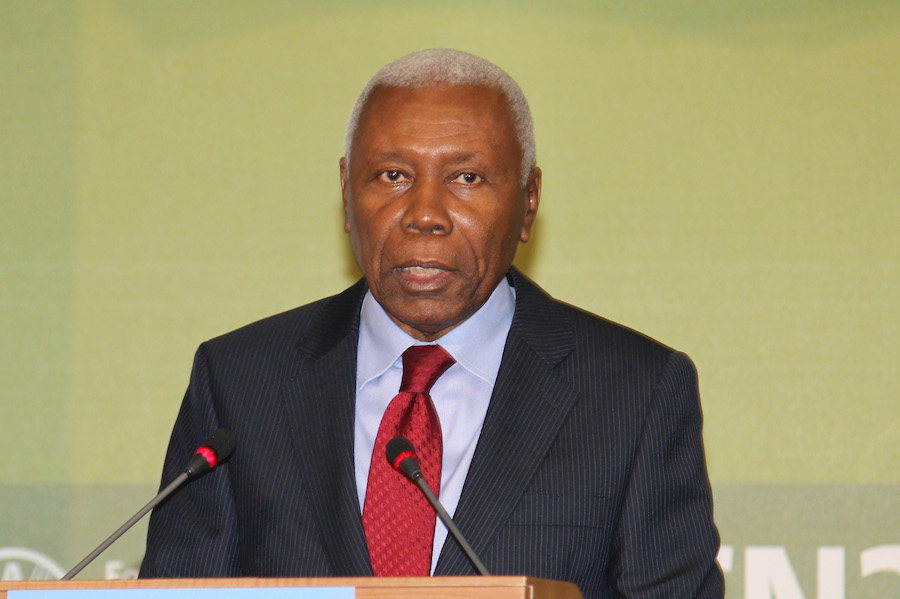
By Usman Inuwa
Tanzanian Vice President Mohammed Gharib Bilal has challenged Africa to avoid pitfalls and mistakes made in previous UN climate conferences as preparations for the twenty-first conference of parties to the United Nations Framework Convention on Climate Change (UNFCCC) heats up.
Mr Bilal made this known today at the opening session of the first round of the series dubbed African Climate Talks (ACTs) in Dar es Salaam.
The East and Southern African round of ACTs is co-organized by the African Climate Policy Center (ACPC) of United Nations Economic Commission for Africa (UNECA) in partnership with the Centre for Climate Change Studies (CCCS) at the University of Dar es Salaam.
According to the Tanzanian Vice President, “Since we are negotiating a new agreement, nobody in Africa will benefit if we make the same mistakes that we made in the Kyoto Protocol negotiations.” He warned that if a new agreement that addresses all the mistakes of the Kyoto Protocol is not reached at the Paris negotiations, then the path to global sustainable development would be jeopardised.
Bilal also enjoined Africa to shift from the tendency of relying on developed countries, charging that the problem of African negotiators in the UN climate negotiations leading up to the Paris Climate Change Conference this December is “lack of real political backing from visionary leaders in the continent.”
During the negotiations in Japan, which led to countries ratifying an agreement that came to be known as the Kyoto Protocol, experts have observed that it was designed to address mitigation of climate change, more than adaptation to the phenomenon.
“The agreement also left out some countries which have since emerged as major greenhouse gas emitters, a fact that has had devastating impact on implementation of the agreement mechanisms,” observed Mithika Mwenda, the Secretary-General of the Pan African Climate Justice Alliance (PACJA).
He further observed that Kyoto Protocol had market-based mechanisms such as Clean Development Mechanism, which ultimately failed to address climate change in countries with negligible emissions.
COP21 is expected to deliver the new climate agreement which will define global climate governance in the post Kyoto period. As such, COP21 will be a land mark event in the evolution of the global climate governance landscape.
The trajectory evolution of the United Nations Framework Convention on Climate Change (UNFCCC) and the associated discussions on the Kyoto Protocol has been complex, and at times controversial, characterized by important convergences but also significant differences between developed and developing countries.
For Africa in particular, COP21 coincides with the increasing influence and confidence of the continent on the global scene, in light of African economies’ notable growth trends over the past decade. COP21is therefore seen as a moment of opportunity for Africa to assert itself in global climate governance and ensure that the outcomes of Paris are congruent with the continent’s long term sustainable development agendas.
According to Fatima Denton, Director of UNECA’s Special Initiatives Division, the three-day conference, with the theme “the Promise of Paris,”seeks to “mobilise the engagement of African civil society, policy makers and other stakeholders in a public discourse in the lead up to COP21 in order to increase public awareness of the key elements of the negotiations, improve the role African decision makers can play in shaping the global climate change governance, and elicit critical reflections on the UNFCCC process and its implications for Africa.
The conference also aspires to elicit critical reflection on the UNFCCC process among Africans. “These reflections will contribute towards the identification of African solutions to the climate challenge,” Denton added.
It is anticipated that the debates at the conference will inform Africa’s positions on the key issues in the post 2015 agreement, provide spaces for national and regional collaboration on climate change; provide platforms for information sharing and interaction between different stakeholders, and accelerate the convergence of the multiple interests in climate issues on the continent.











